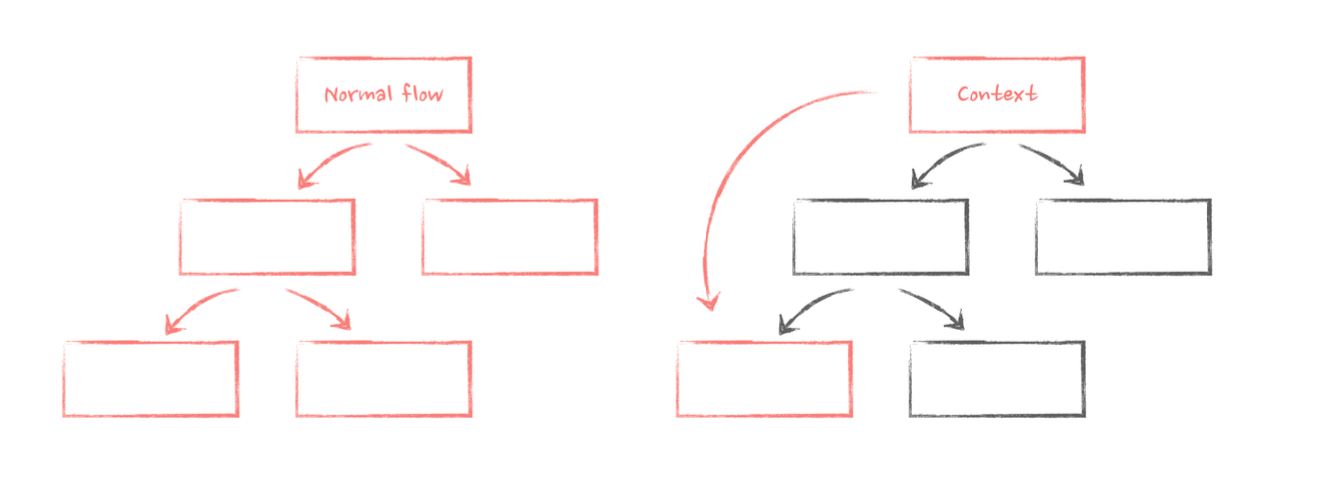Context的作用

Context可以让我们在组件树中传递数据,而不需要通过props一层层传递。
但是有一些需要注意的点。
- Context consumers will re-render when the value on the Provider changes.
- All of them will re-render, even if they don’t use the part of the value that actually changed.
- Those re-renders can’t be prevented with memoization (easily).
Context的value改变
const NavigationController = ({ children }) => {
const [isNavExpanded, setIsNavExpanded] = useState();
const toggle = () => setIsNavExpanded(!isNavExpanded);
const value = { isNavExpanded, toggle };
return (
<Context.Provider value={value}>
{children}
</Context.Provider>
);
};
const useNavigation = () => useContext(Context);
每次value改变的时候, 使用useNavigation的组件都会重新渲染。这很正常,但是如果是因为其他原因,导致value改变呢?比如
const Layout = ({ children }) => {
const [scroll, setScroll] = useState();
useEffect(() => {
window.addEventListener('scroll', () => { setScroll(window.scrollY);});
},[]);
return (
<NavigationController>
<div className="layout">{children}</div>
</NavigationController>
);
};
现在,只要window滚动,就会造成NavigationController重新渲染, NavigationController重新渲染导致value重新创建,导致依赖value的组件重新渲染。
其实value里面的isNavExpanded和toggle并没有发生变化,为了解决这个问题,可以使用useMemo来缓存value。
const NavigationController = ({ children }) => {
const [isNavExpanded, setIsNavExpanded] = useState();
const toggle = useCallback(() => {
setIsNavExpanded(!isNavExpanded);
}, [isNavExpanded]);
const value = useMemo(() => {
return { isNavExpanded, toggle };
}, [isNavExpanded, toggle]);
return (
<Context.Provider value={value}>
{children}
</Context.Provider>
);
};
接下来再来看一个场景,代码如下:
import React, { ReactNode, useCallback, useContext, useEffect, useMemo, useState } from 'react';
import { AnotherVerySlowComponent, VerySlowComponent } from './components/very-slow-component';
import './styles.scss';
const Context = React.createContext({
isNavExpanded: false,
toggle: () => {},
close: () => {},
open: () => {},
});
const NavigationController = ({ children }: { children: ReactNode }) => {
const [isNavExpanded, setIsNavExpanded] = useState(false);
const toggle = useCallback(() => {
setIsNavExpanded(!isNavExpanded);
}, [isNavExpanded]);
const open = useCallback(() => {
setIsNavExpanded(true);
}, []);
const close = useCallback(() => {
setIsNavExpanded(false);
}, []);
const value = useMemo(() => {
return { isNavExpanded, toggle, close, open };
}, [isNavExpanded, toggle, close, open]);
return <Context.Provider value={value}>{children}</Context.Provider>;
};
const useNavigation = () => useContext(Context);
const AdjustableColumnsBlock = () => {
const { isNavExpanded } = useNavigation();
return isNavExpanded ? <div>two block items here</div> : <div>three block items here</div>;
};
const withNavigationOpen = (AnyComponent: any) => {
// wrap the component from the arguments in React.memo here
const AnyComponentMemo = React.memo(AnyComponent);
return (props: any) => {
const { open } = useContext(Context);
// return memoized component here
// now it won't re-render because of Context changes
// make sure that whatever is passed as props here don't change between re-renders!
return <AnyComponentMemo {...props} openNav={open} />;
};
};
const MainPart = withNavigationOpen(({ openNav }: { openNav: () => void }) => {
useEffect(() => {
// won't be triggered when context value changes
// because toggleNav is coming from memoized HOC
console.info('Main part re-render');
});
return (
<>
<div>
<button onClick={openNav}>click to expand nav - inside heavy component</button>
</div>
<VerySlowComponent />
<AnotherVerySlowComponent />
<AdjustableColumnsBlock />
</>
);
});
const ExpandButton = () => {
const { isNavExpanded, toggle } = useNavigation();
useEffect(() => {
console.info('Button that uses Context re-renders');
});
return <button onClick={toggle}>{isNavExpanded ? 'collapse <' : 'expand >'}</button>;
};
const SidebarLayout = ({ children }: { children: ReactNode }) => {
const { isNavExpanded } = useNavigation();
return (
<div className="left" style={{ flexBasis: isNavExpanded ? '50%' : '20%' }}>
{children}
</div>
);
};
const Sidebar = () => {
return (
<SidebarLayout>
{/* this one will control the expand/collapse */}
<ExpandButton />
<ul>
<li>
<a href="#">some links</a>
</li>
</ul>
</SidebarLayout>
);
};
const Layout = ({ children }: { children: ReactNode }) => {
const [scroll, setScroll] = useState(0);
useEffect(() => {
window.addEventListener('scroll', () => {
setScroll(window.scrollY);
});
}, []);
return (
<NavigationController>
<div className="three-layout">{children}</div>
</NavigationController>
);
};
const Page = () => {
return (
<Layout>
<Sidebar />
<MainPart />
</Layout>
);
};
export default function App() {
return (
<>
<h3>Very slow "Page" component - click on expand/collapse to toggle nav</h3>
<p>Scrolling causes re-render of everything that uses Context</p>
<Page />
</>
);
}
上面的代码实现了一个Sidebar和MainPart2个部分,Sidebar中有个button可以控制折叠,MainPart中根据Sidebar是否折叠展示不同的layout。
MainPart中有些slow的组件。在withNavigationOpen中使用了meme,如果没有meme,每次MainPart都是在Sidebar折叠的时候重新渲染。但是MainPart中的slow的组件并不依赖于Sidebar是否折叠。
造成这个问题的原因是withNavigationOpen中使用了useContext(Context), 由于isNavExpanded改变,导致Context的value变化,AnyComponent就会重新渲染,但是open其实是不依赖于isNavExpanded,所以AnyComponent加上memo后,props和openNav没有变化,就不会重新渲染了。
const withNavigationOpen = (AnyComponent: any) => {
// wrap the component from the arguments in React.memo here
const AnyComponentMemo = React.memo(AnyComponent);
return (props: any) => {
const { open } = useContext(Context);
// return memoized component here
// now it won't re-render because of Context changes
// make sure that whatever is passed as props here don't change between re-renders!
return <AnyComponentMemo {...props} openNav={open} />;
};
};